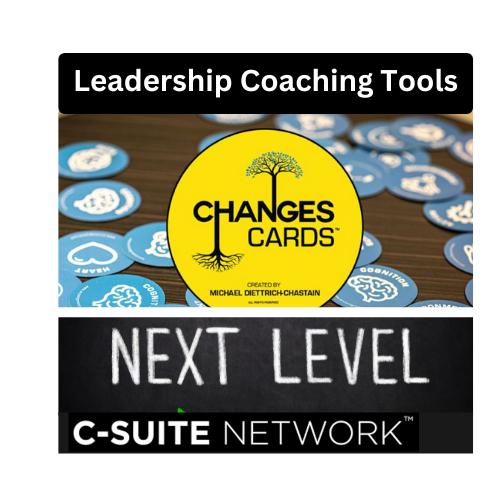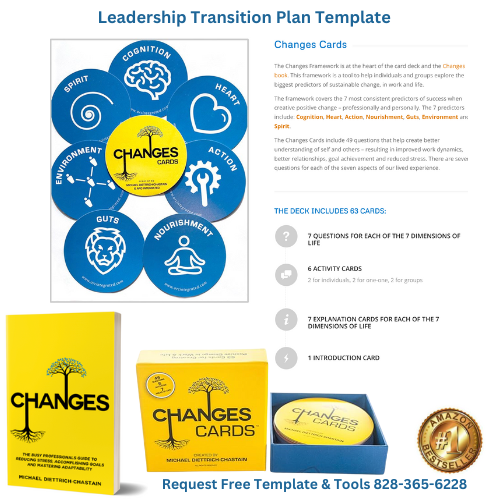Leadership Coaching Tools
Leadership Coaching Card Deck

POSITIVE CHANGES – The Changes Framework is a tool for the office, the team and even at home. This framework helps ask better questions, of ourselves and others, resulting in goal accomplishment, improved relationships and less stress.
CREATE A BETTER UNDERSTANDING – The Changes Cards include 49 questions that help create better understanding of self and others – resulting in improved work dynamics, better relationships, goal achievement and reduced stress. There are seven questions for each of the seven aspects of our lived experience.
7 CONSISTENT PREDICTORS OF SUCCESS – The framework covers the 7 most consistent predictors of success when creative positive change – professionally and personally. The 7 predictors include: Cognition, Heart, Action, Nourishment, Guts, Environment and Spirit.
CHANGES FRAMEWORK – The Changes Framework is at the heart of the card deck and the Changes book. This framework is a tool to help individuals and groups explore the biggest predictors of sustainable change, in work and life.
Leadership Coaching Tools, Tips, and Ideas
- Active Listening: Practice active listening to understand your team better.
- Empathy: Show empathy towards your team members’ concerns and feelings.
- Communication Skills: Work on improving your communication skills.
- Feedback: Give and receive constructive feedback regularly.
- Goal Setting: Set clear and achievable goals for yourself and your team.
- Time Management: Master time management techniques to be more efficient.
- Delegation: Learn to delegate tasks effectively.
- Conflict Resolution: Develop conflict resolution skills.
- Decision-Making: Make informed and timely decisions.
- Problem-Solving: Enhance your problem-solving abilities.
- Self-awareness: Reflect on your strengths and weaknesses as a leader.
- Team Building: Foster a sense of unity and cooperation within your team.
- Motivation: Find ways to motivate and inspire your team.
- Adaptability: Be flexible and adapt to changing situations.
- Creativity: Encourage creative thinking and innovation.
- Transparency: Be open and honest in your communication.
- Trust: Build and maintain trust with your team.
- Conflict Management: Develop strategies for managing conflicts within the team.
- Mentorship: Consider mentoring or being mentored.
- Leadership Styles: Understand different leadership styles and when to use them.
- Team Diversity: Embrace diversity within your team.
- Crisis Management: Be prepared to handle crises effectively.
- Ethical Leadership: Lead with integrity and ethical principles.
- Stress Management: Learn to manage stress and help your team do the same.
- Feedback Culture: Create a culture of giving and receiving feedback.
- Decision-Making Models: Explore various decision-making models.
- Change Management: Handle organizational changes smoothly.
- SWOT Analysis: Use SWOT analysis for strategic planning.
- Leadership Assessments: Take leadership assessments for self-improvement.
- Coaching Skills: Develop coaching skills to help your team grow.
- Appreciative Inquiry: Apply the principles of appreciative inquiry.
- Storytelling: Use storytelling to convey your vision and goals.
- Networking: Build a strong professional network.
- Conflict Avoidance: Learn when to avoid unnecessary conflicts.
- Data Analysis: Use data-driven insights to make decisions.
- Resilience: Cultivate resilience in yourself and your team.
- Continuous Learning: Never stop learning and improving.
- Team Empowerment: Empower your team to take ownership of their work.
- Decision Trees: Use decision trees for complex choices.
- Emotional Intelligence: Develop emotional intelligence.
- Appraisal and Recognition: Recognize and reward achievements.
- Cross-functional Teams: Foster collaboration among different departments.
- Strategic Planning: Create a clear strategic plan.
- Leading Remote Teams: Learn to lead remote teams effectively.
- Innovation Labs: Establish innovation labs for creative solutions.
- Leadership Workshops: Attend leadership workshops and seminars.
- Leadership Development Plans: Create personalized development plans.
- Feedback Surveys: Conduct surveys to gather feedback.
- Employee Engagement: Focus on employee engagement strategies.
- Customer Focus: Put the customer at the center of decision-making.
- Diversity and Inclusion Training: Invest in diversity and inclusion training.
- Authenticity: Be authentic in your leadership style.
- Coaching Circles: Form coaching circles for peer learning.
- Mental Health Support: Promote mental health awareness and support.
- Leadership Assessments: Use leadership assessments for team members.
- Self-Care: Prioritize self-care to maintain your well-being.
- Cross-cultural Leadership: Learn about cross-cultural leadership.
- Leadership Retreats: Organize leadership retreats for team bonding.
- Systems Thinking: Understand and apply systems thinking.
- Leadership Literature: Read books on leadership regularly.
- Leadership Journals: Keep a leadership journal for self-reflection.
- Reverse Mentoring: Consider reverse mentoring with younger team members.
- Resource Allocation: Efficiently allocate resources within your team.
- Community Engagement: Get involved in community leadership.
- Leadership Podcasts: Listen to leadership podcasts for insights.
- Time for Innovation: Allocate time for innovative projects.
- Leadership 360 Feedback: Seek 360-degree feedback.
- Ethical Dilemmas: Prepare for ethical dilemmas in leadership.
- Strengths-Based Leadership: Focus on leveraging strengths.
- Coaching Models: Explore various coaching models.
- Mindfulness: Practice mindfulness for better decision-making.
- Decision Support Tools: Use decision support software.
- Public Speaking: Improve your public speaking skills.
- Digital Leadership: Embrace digital tools for leadership.
- Situational Leadership: Adapt your leadership style to the situation.
- Leadership Conferences: Attend leadership conferences.
- Peer Coaching: Engage in peer coaching relationships.
- Conflict Mediation: Learn mediation techniques.
- Risk Management: Manage risks effectively.
- Leadership Simulations: Use leadership simulations for training.
- Leadership Competencies: Define and develop leadership competencies.
- Leadership Dashboards: Create leadership performance dashboards.
- Collaborative Tools: Use collaborative software for team coordination.
- Leadership Books: Read classic leadership books.
- Customer Feedback: Incorporate customer feedback into improvements.
- Leadership Ethics: Discuss ethical dilemmas with your team.
- Coaching Apps: Explore coaching apps for leadership development.
- Peer Accountability: Promote peer accountability within the team.
- Strategic Partnerships: Form strategic partnerships for growth.
- Strengths Assessments: Use strengths assessments for team members.
- Conflict Transformation: Transform conflicts into opportunities.
- Scenario Planning: Plan for various scenarios.
- Leadership Assessments: Regularly assess your leadership skills.
- Emotional Agility: Develop emotional agility for better leadership.
- Cross-functional Training: Train team members in other areas.
- Leadership TED Talks: Watch inspiring leadership TED Talks.
- Ethical Decision-Making: Teach ethical decision-making to your team.
- Mindful Leadership: Lead with mindfulness and presence.
- Leadership Challenges: Embrace leadership challenges as learning opportunities.
- Celebrate Success: Celebrate achievements and milestones with your team.
Looking for Tools like: Less Annoying CRM’s or Monday Rituals?
Leadership Transition Plan Template
Are you a board member or part of a leadership transition team looking for a guide or template to help navigate the process? Get started with our Leadership Transition Plan Template & Free Consultation by calling 828-365-6228

